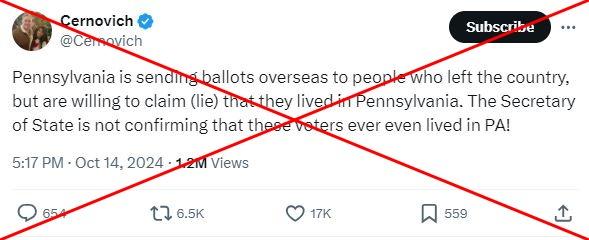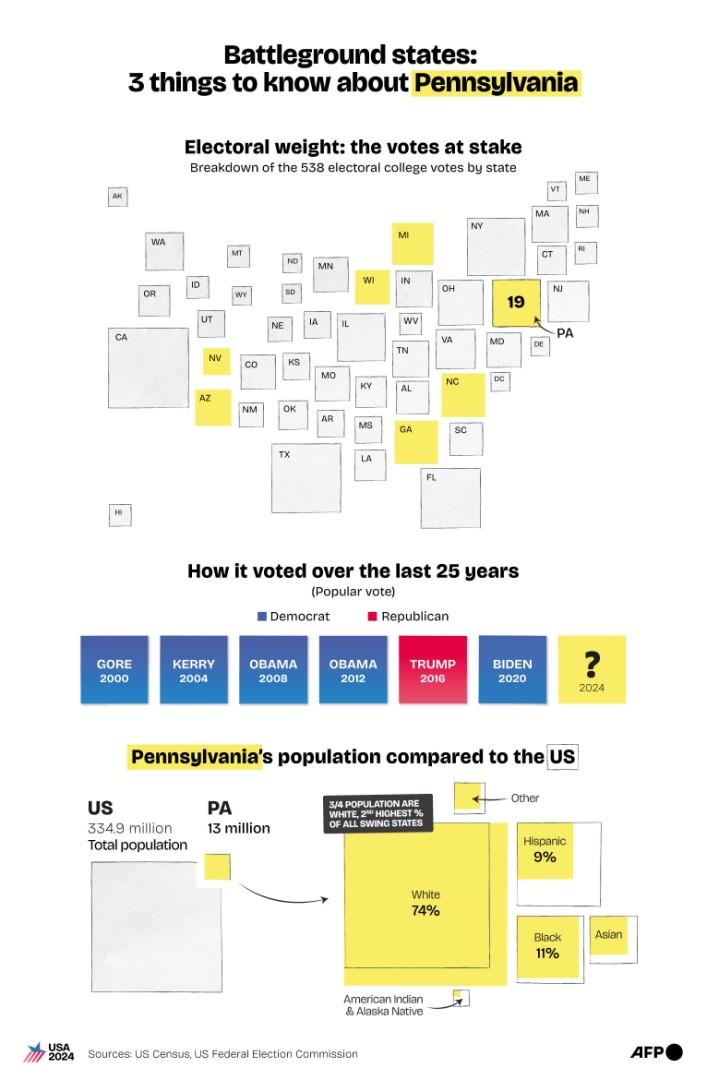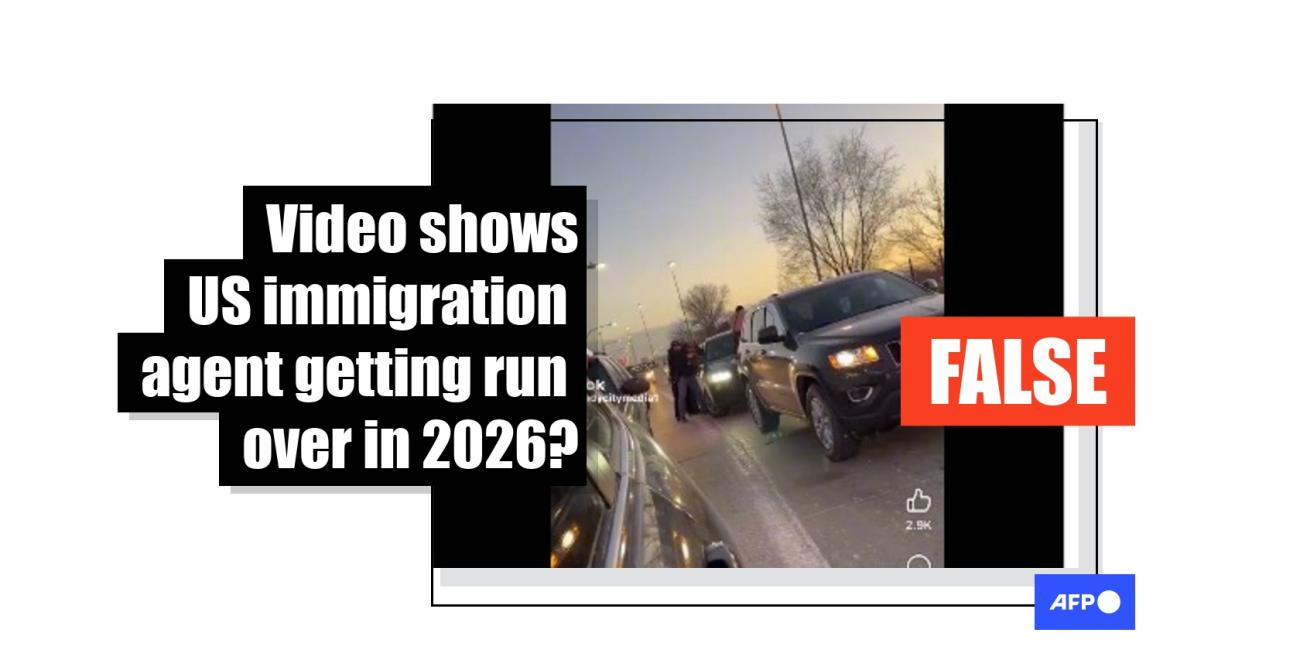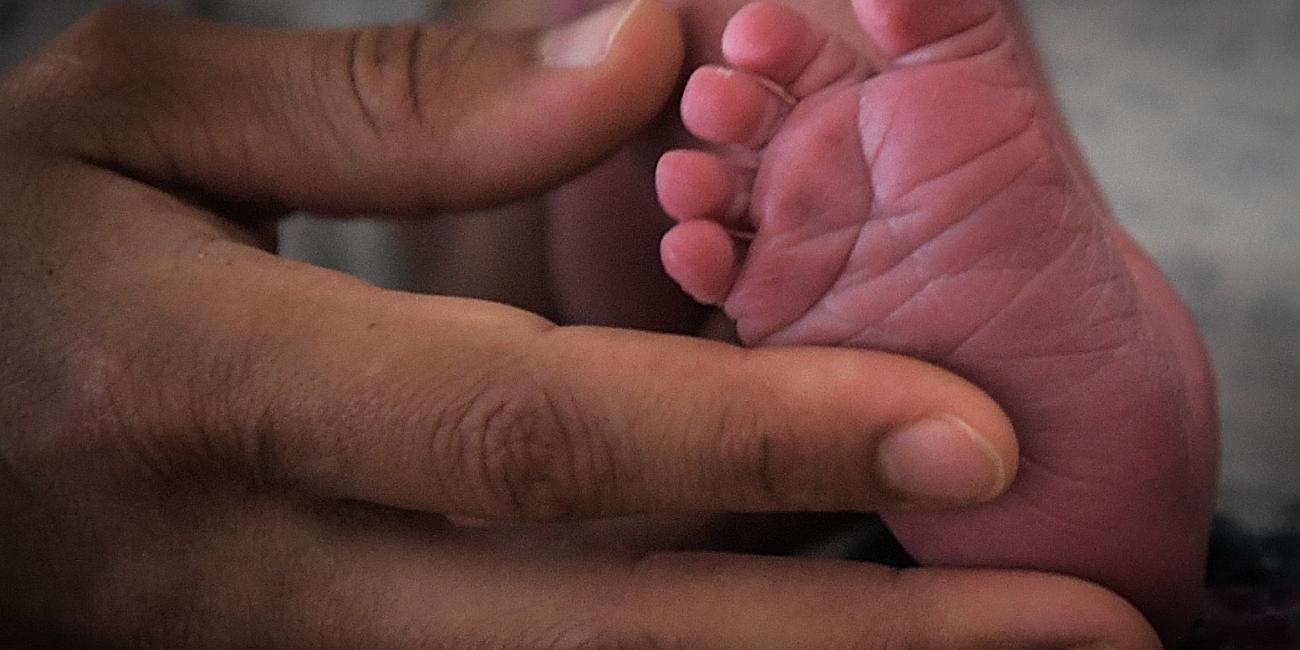
Pennsylvania targeted by unfounded claims of overseas voter fraud
- This article is more than one year old.
- Published on October 30, 2024 at 17:51
- Updated on October 30, 2024 at 19:31
- 4 min read
- By Daniel Patrick GALGANO, AFP USA
"Pennsylvania is sending ballots overseas to people who left the country, but are willing to claim (lie) that they lived in Pennsylvania. The Secretary of State is not confirming that these voters ever even lived in PA!" says an October 14, 2024 X post from Mike Cernovich, a far-right conspiracy theorist.

The post accumulated tens of thousands of interactions. The same claim has circulated elsewhere on X, Rumble and Gettr.
Claims that US states are allowing non-citizens to vote in federal elections have become a major disinformation theme this election cycle. An October NPR/PBS News/Marist poll found about 52 percent of Americans are concerned or very concerned that non-citizens will cast ballots this year, despite there being no such evidence (archived here).
In late September, six Republicans running for re-election to Congress filed a lawsuit accusing Pennsylvania officials of sending more than 25,000 ballots to overseas and military voters without verifying their US citizenship or ties to the state (archived here). The complaint also suggested the Iranian government could exploit Pennsylvania's overseas registration system to interfere in the election.
A federal judge in Pennsylvania dismissed the lawsuit on October 29, after courts in the swing states of Michigan and North Carolina threw out similar complaints (archived here).
"Pressed for anything that might corroborate whether 'there's been some Iranian influence over Pennsylvania's overseas ballots,' counsel effectively conceded that all he had was 'concerns.' Plaintiffs cannot rely on phantom fears of foreign malfeasance to excuse their lack of diligence," US District Judge Chris Connor wrote in his decision (archived here).
A Pennsylvania secretary of state spokesperson told AFP the online claims about overseas ballot fraud are "false" and that rare instances of ineligible votes are "routinely investigated and prosecuted by the appropriate authorities when they occur."
Registration requirements
Overseas registration for both civilian and military voters is regulated by the Uniformed and Overseas Citizens Absentee Voting Act (UOCAVA), which established a federal application for service members and citizens living abroad to register to vote and request a ballot (archived here and here).
The application requires voters to swear under penalty of perjury that they are US citizens and eligible to vote. The online version of the form for Pennsylvania also asks for the last four digits of the applicant's Social Security number or state identification card number.
Pennsylvania law defines three types of overseas voters: members of the armed forces who are registered to vote, civilians who are registered to vote, and citizens who are not registered to vote in Pennsylvania and therefore can only cast ballots in federal elections (archived here).

According to state guidance (archived here), the third category of overseas voters mainly applies to people who have previously lived in Pennsylvania and do not intend to return. Pennsylvania does not allow citizens who have never lived in the United States to vote in the state (archived here).
"The Department of State directs counties to process ballot applications from military and overseas voters pursuant to federal and state law, which provides special protections for such voters," the Pennsylvania secretary of state spokesperson said in an October 24 email.
"Attempts to disenfranchise such voters, many of whom put their lives on the line to defend our country, are shameful."
'Act of desperation'
Susan Dzieduszycka-Suinat, chief executive officer of the US Vote Foundation and founder of Overseas Vote (archived here), said she is only aware of one instance in which someone tried to unlawfully receive an overseas or military ballot in an effort to prove state systems could not catch fraudulent activity.
In March, a jury found former Wisconsin election official Kimberly Zapata guilty of illegally requesting military ballots using fictitious names and sending some of them to state lawmakers.
The conservative Heritage Foundation, which maintains a database of criminal election fraud convictions (archived here), has no record of cases related to overseas or military ballots other than Zapata's.
"This is kind of going far afield to try to find voter fraud," Dzieduszycka-Suinat said October 29 of the claims swirling online. "It's an act of desperation, frankly, because this is about the last place you're gonna ever find it."
Dzieduszycka-Suinat said the string of lawsuits and false claims about overseas voting has caused "a lot of damage" for advocates who try to persuade voters that casting their ballots by mail is safe.
Sarah Streyder, executive director of the Secure Families Initiative (archived here), a nonprofit that advocates for US military families, said the organization's members were "encouraged" by the Pennsylvania, Michigan and North Carolina suits being dismissed because it affirms their right to vote in federal elections.
"It's frustrating to make these arguments in the first place," she said October 29.
AFP has fact-checked other misinformation about the 2024 US election here.
This article was updated in the second paragraph to correct a link.October 30, 2024 This article was updated in the second paragraph to correct a link.
Copyright © AFP 2017-2026. Any commercial use of this content requires a subscription. Click here to find out more.
Is there content that you would like AFP to fact-check? Get in touch.
Contact us




